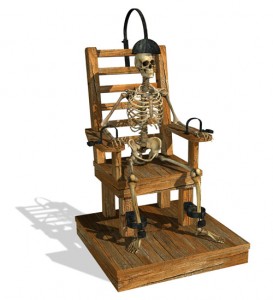Contributed by Bob Chell, University Lutheran Center, Brookings, SD
Warm-up Question
If God is in all places, at all times, how can God stand by while bad things happen?
Unspoken Questions
 In 1862 the largest mass hanging in United States history occurred in Mankato, Minnesota. Thirty- eight Dakota men of the Santee nation were executed for taking part in what has been called “Little Crow’s War.”
In 1862 the largest mass hanging in United States history occurred in Mankato, Minnesota. Thirty- eight Dakota men of the Santee nation were executed for taking part in what has been called “Little Crow’s War.”
The Dakota people were promised much but received little in payment for the land taken from them by the U.S. government. Unscrupulous traders and dishonest agents stole food and annuity payments until hunger and hardship drove the Santee to send out a hunting party of four in mid-August. The hunting party encountered white settlers and five settlers died. Things spun out of control and, after order was restored, President Abraham Lincoln ordered the hanging of 38 Santee men.
Jim Miller had a dream. Jim is a member of the Santee Nation. In 2008 he organized what has become an annual trek on horseback from the Crow Creek reservation of South Dakota to the riverbank where the executions took place, a distance of 330 miles. Jim’s dream was not simply to make the trek, but to bring healing and reconciliation. The ride was commemorated in the film, Dakota 38 Engaging History.
Discussion Questions
- Does God take an active role in the world?
- To what degree are greedy Indian agents from the 1850s responsible for widespread poverty on reservations today?
- Many children of divorced families struggle. Who is to blame?
- Are retribution and reconciliation compatible?
Scripture Texts (NRSV) for Sunday, April 10, 2011 (Fifth Sunday in Lent)
(Text links are to Oremus Bible Browser. Oremus Bible Browser is not affiliated with or supported by the Evangelical Lutheran Church in America. You can find the calendar of readings for Year C at Lectionary Readings.)
For lectionary humor and insight, check the weekly comic Agnus Day.
Gospel Reflection
As a campus pastor, people come to me with hard questions, questions with no easy answers. I get a call in the middle of the night asking, “If a person commits suicide, do they go to hell?” I’m pretty sure this is more than a disinterested quest for information. So I want to know if the caller has a term paper due at 8:00 a.m. or if, perhaps, their fiancé broke off their engagement earlier in the evening. The asked question is theological; the unspoken one is personal. The first is about God, the second about the person’s deepest pain.
We can ponder the source of monstrously evil people and events in the world. Think Hitler and Holocaust. We can probe for an explanation of great tragedy arising from nature. Think earthquake and tsunami. These are theological questions. Martha says to Jesus, “If you had been here, my brother would not have died,” and the unspoken question is, “Why weren’t you here when I needed you most?” That question comes to our hearts and lips when death darkens our house, when our parent’s divorce, when the person we love does not return our affection. It is a profoundly personal question. We can discuss the former questions but often only sit in silence in the face of the latter.
I hesitated writing the last of the above discussion questions, knowing that for some it is a deeply personal question. I kept it because the gospel is deeply personal. Jesus didn’t come to tell bad people to be good people or to explain away deep, unrelenting pain with soothing words. Jesus did proclaim God’s promises to Martha. Jesus did raise her brother Lazarus that day but Jesus response first response on seeing the body of his friend was to weep. Many have memorized John 11:35 because it is the shortest verse in the Bible: “Jesus wept.” I contend it is among the most profound. It reminds us that Jesus stands with us in our pain, not over us in judgment when our lives are in turmoil.
Where is Jesus when my parent’s divorce, when a young Native American girl takes her own life, when thousands die in a tsunami or at the hand of evil tyrants? Jesus is there; weeping, standing with all in their deepest pain, their sharpest grief, their greatest regret.
Discussion Questions
- Can you identify a time in your life when you felt abandoned by God? Looking back, was God with you? If so, how was God present?
- When your pain has been deep and unrelenting, which words were helpful? Hurtful?
- Can a person be close to God and far away from God at the same time?
- Is trusting God different than believing in God?
Activity Suggestion
Make a timeline of your faith history: Draw a line horizontally in the middle of a sheet of paper and label it with significant events in your life; your birth on one end and today on the other. Write joys and sorrows as they happened; great joys high on the page and deep sorrows near the bottom. Connect them and you’ll see how your life has ups and downs. Now place a G when your faith was greatest, an A where your faith was absent, and an O where you weren’t thinking about God at all. Connect them and you’ll see the ups and downs of your faith journey.
Share with one other person your greatest joy and your deepest sorrow. Do the ways you felt about God’s presence at those times coincide with what you believe about God’s presence at those times now that you look back?
Closing Prayer
God, you know our deep pain, our secret shames, and the unrelenting pain which threatens us to make us despair. Help us to feel your presence in our hearts and not just in our heads. Give us confidence in your promises, so that we will trust you and cling to your promises when doubt gnaws at our faith. Amen.


 Finding fault and placing blame are things that all people do. Somehow it just seems to make us feel better when we can place the blame for someone on someone’s shoulders. Of course, it only serves to make us feel comfortable if we can place the blame on someone else’s shoulders. There are times when placing blame isn’t just a matter of words, but of serious consequences: sometimes thousands or millions of dollars, or other punishments.
Finding fault and placing blame are things that all people do. Somehow it just seems to make us feel better when we can place the blame for someone on someone’s shoulders. Of course, it only serves to make us feel comfortable if we can place the blame on someone else’s shoulders. There are times when placing blame isn’t just a matter of words, but of serious consequences: sometimes thousands or millions of dollars, or other punishments.